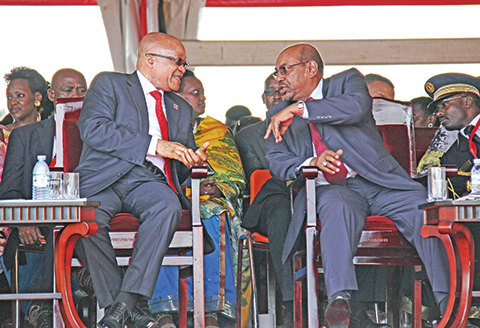P
 South Africa's President Jacob Zuma (L) speaks with Sudan's President Omar al-Bashir (R) during the swearing in ceremony of Uganda's President Yoweri Museveni as newly elected President in Kampala on May 12, 2016.
South Africa's President Jacob Zuma (L) speaks with Sudan's President Omar al-Bashir (R) during the swearing in ceremony of Uganda's President Yoweri Museveni as newly elected President in Kampala on May 12, 2016.Museveni 71, won February's election though the result has been challenged by opposition leaders, one of whom has been held under house arrest for most of the weeks since. More than a dozen heads of state, including Kenya's Uhuru Kenyatta and Sudan's Omar al-Bashir, attended the swearing-in ceremony, the fifth since Museveni took power in 1986 at the head of a rebel army. AFP
ORT ELIZABETH, SOUTH AFRICA: Sitting in his wooden shack in a township in Port Elizabeth, Kwanele Mphelo reels off a list of gripes with South Africa's ruling African National Congress. "We feel left down by the government-especially the party that was supposed to represent the black people and take us out of poverty."
"We have no water, no sanitation," the 39-year-old security guard said, adding that the brick house he was promised by the ANC-run townhall had never materialized either. Mphelo's views sum up a growing sentiment among voters in this one-time bastion of the former liberation movement.
Since 1994, when Nelson Mandela swept to power in South Africa's first democratic elections, the ANC has reigned supreme at the national and regional level, with only one city-Cape Town-escaping its clutches.
But change may be in the offing at local elections on August 3. With President Jacob Zuma reeling from a series of corruption scandals and court battles, the party's grip is looking tenuous in some cities, including Port Elizabeth. Suffering 36-percent unemployment, compared with a national average of 27 percent, South Africa's sixth-biggest city-a car manufacturing hub-has been hard hit by shrinking economic growth.
The main opposition Democratic Alliance (DA), which is in power in Cape Town, is hoping to harness the disillusionment of people like Mphelo to win control of the city at the upcoming municipal elections. During the last local elections in 2011, the DA polled 40 percent in Port Elizabeth, 11 points behind the ANC. By the 2014 general elections, the gap had narrowed to 48 percent for the ANC, to 42 for the liberal DA.
Track record
With Zuma weakened by a court finding that he breached the constitution by failing to repay millions of dollars of public money spent on his private residence, the DA-long seen as the party of white and mixed-race South Africans-is hoping to break new ground.
"We're convinced that the ANC's track records of service delivery, poor government, massive allegations of corruption, expenditure on public transport that... doesn't work, are all factors that will compound the ANC's declining support," DA member Athol Trollip told AFP.
A 52-year-old white farmer who speaks both Afrikaans and Xhosa, the language of Eastern Cape's biggest ethnic group, Trollip is running for mayor in the election. He faces a formidable opponent in current mayor Danny Jordaan, the chief organizer of the 2010 World Cup in South Africa.
The ANC is not resting on its laurels. Conscious of the risk of losing the Indian Ocean city, Zuma chose it last month to host the launch of the party's campaign for the local elections.
There were empty seats in the 46,000-capacity stadium when Zuma took to the stage but Home Affairs Minister Malusi Gigaba said he was confident the party of Eastern Cape's best-loved son, Nelson Mandela, would retain control of the city. "People know our track record... (they) trust our experience and the vision that the ANC will put forward to them," he told AFP. After 22 years in power, the liberation party still enjoys significant support among the black majority.
Zuma factor
In Wells Estate, in the north of the city, a tightly-packed crowd of several hundred supporters dressed in yellow and green ANC regalia gathered to welcome Zuma on his visit last month.
The gregarious 74-year-old Zulu, whose political woes were compounded last month when a court ruled he should be charged with corruption in a state arms deal, gave a fiery speech in Xhosa that was roundly applauded. "The community likes the ANC," Nondikho Gana, the ANC councillor for the area, declared proudly.
While water and power supplies may still be haphazard in places, public services are improving, he argued. "This area started to develop in 2002 and currently we are building 1,280 houses," she said. Zuma's future could be riding on the outcome of the local elections, with the DA even hoping to take the capital Pretoria and economic hub Johannesburg.
While the ANC's top brass have closed ranks around the president so far, they might be tempted to cast about for a replacement leader if voters walk away in their droves. "If local election results are not that bad, he may well stay on for the full term (until 2019)," Peter Montalto, an analyst at Nomura bank, told AFP. "The interesting scenario of course is if the ANC does very badly."-AFP










